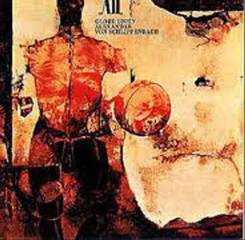Alexander Von Schlippenbach - Globe Unity (1967)
Alexander Von Schlippenbach - Globe Unity (1967)

A. Globe Unity Alto Saxophone – Peter Brötzmann Baritone Saxophone – Kris Wanders Baritone Saxophone, Soprano Saxophone – Willem Breuker Bass [Left Channel] – Peter Kowald Bass [Right Channel] – Buschi Niebergall Bass Clarinet, Flute – Gunter Hampel Conductor, Piano, Bells [Tubular], Tom Tom, Gong, Composed By – Alexander von Schlippenbach Cornet, Flugelhorn – Manfred Schoof Drums [Left Channel] – Jackie Liebezeit Drums [Right Channel] – Mani Neumeier Tenor Saxophone – Gerd Dudeck Trumpet – Claude Deron Tuba – Willi Lietzmann B. Sun Bells [Small, Left Channel] – Peter Kowald Drums [Kettledrums, Left Channel], Temple Block [Left Channel], Goblet Drum [Left Channel] – Jackie Liebezeit Flute [Lotus Flute I] – Claude Deron Guiro – Peter Brötzmann Maracas – Willi Lietzmann Pandeiro – Gunter Hampel Knife, Flexafon – Alexander von Schlippenbach Rattle – Willem Breuker Siren [Right Channel] – Buschi Niebergall Tom Tom [Tam Tam], Wood Block, Percussion [Mani Tom, Right Channel], Gong [Right Channel], Tabla [Right Channel] – Mani Neumeier Triangle – Manfred Schoof Vibraphone – Karlhanns Berger Whistle [Duck Call] – Gerd Dudeck Zurna [Zorna], Flute [Lotus Flute Ii], Alto Saxophone – Kris Wanders
A lot of music rests its magic on being “cosmic,” of appealing to some sort of connection between the abstractions of sound and the abstractions of transcendental experience. Yet, very little music succeeds in being “planetary.” Alexander von Schlippenbach’s first outing with the Globe Unity Orchestra is a fascinating portrait of planetary globalization in the late 1960s, a fully discordant pile-up of instruments all atop a single pianist trying to keep it cuttable onto two sides of a record. Why would “globe unity,” the soft and “world music” sounding variant of globalization, be harmonized and mellifluous? --- dustedmagazine.tumblr.com
One of Europe's premier free jazz bandleaders, pianist Alexander von Schlippenbach's music mixes free and contemporary classical elements, with his slashing solos often the link between the two in his compositions. Schlippenbach formed the Globe Unity Orchestra in 1966 to perform the piece "Globe Unity," which had been commissioned by the Berliner Jazztage. He remained involved with the orchestra into the '80s, with the exception of one period from 1971 to 1972. Schlippenbach began taking lessons at eight, and studied at the Staatliche Hochschule for Musik in Cologne with composers Bernd Alois Zimmermann and Rudolf Petzold. He played with Gunther Hampel in 1963, and was in Manfred Schoof's quintet from 1964 to 1967. Schlippenbach began heading various bands after 1967, among them a 1970 trio with Evan Parker and Paul Lovens (both were also in his quartet along with bassist Peter Kowald), and a duo with drummer/vocalist Sven-Ake Johansson which they co-formed in 1976. Schlippenbach has also given many solos performances. In the late '80s, he formed the Berlin Contemporary Jazz Orchestra, which has featured a number of esteemed European avant-garde jazz musicians including Evan Parker, Paul Lovens, and, as the orchestra's second pianist, Misha Mengelberg, then Aki Takase. Alexander von Schlippenbach has most frequently recorded for FMP, although Japo, Saba, and Po Torch have also released some of his work. In 2000, the Atavistic label was added to this list with their reissue of the Schlippenbach Quartet's 1975 album Hunting the Snake. ---karyobin, blindman.fr.yuku.com
download (mp3 @192 kbs):
uploaded yandex 4shared mega mediafire solidfiles zalivalka cloudmailru oboom








